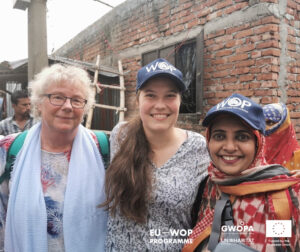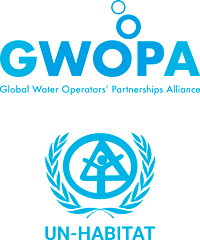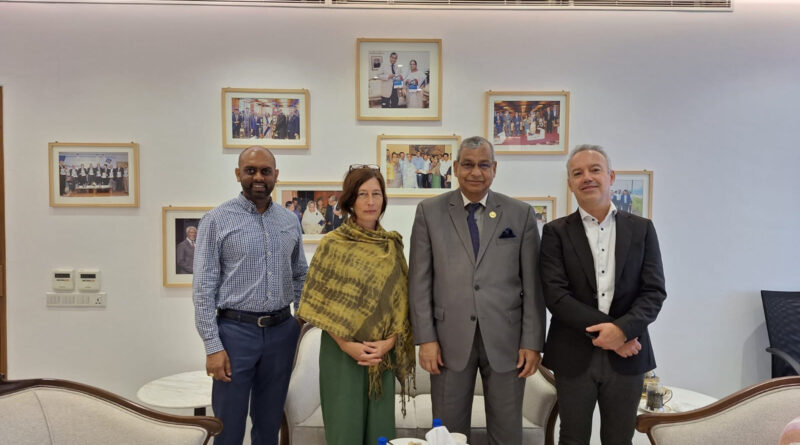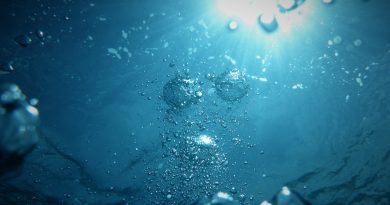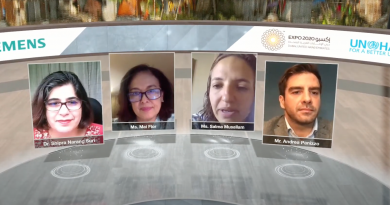EU WOP Mission to Dhaka
What is the added value of a WOP?
Several of the EU-WOP projects did not start from scratch and are building on longstanding WOP relationships. The EU-WOP between Dhaka Water Supply and Sewerage Authority (Dhaka WaSA) and Vitens Evides International is one of these. October 2023, it celebrated its many successes over a 10-year and running partnership at a symposium hosted by the Embassy of the Kingdom of The Netherlands, gathering WOP partners, government representatives, UN agencies, NGOs, and local water and sanitation experts.
Because well-executed WOPs are strongly integrated within the utility’s ongoing business and major investments, it can sometimes be a challenge to say what the WOP accomplished independently. Meeting with operator partners helped trace the path between the beginnings of the partnership, the ongoing utility turnaround, and the collaboration, clarifying how the new knowledge, innovation, and support to improved practices brought in by the WOP have catalysed or helped make the best use of, investments made by the utility and its funders like the Asian Development Bank.
An image of the WOP emerged as a source of ongoing inspiration and support, perennially nourishing the utility with new ideas, knowledge and good practices to sprout new improvements and sustain others. The amount of money going into the WOP has been minimal compared with the accompanying hardware investments made by Dhaka WASA with the support of financial institutions. However, it has ensured that these investments flourish.
Pictures below show the physical condition of Bashantek, the Dhaka slum area; its residents can now access legal and safe 24/7 treated tap water in their homes. The community-managed maintenance of the service has been rated very highly by customers, and bill collection is impressively efficient, with a rate of 98%.
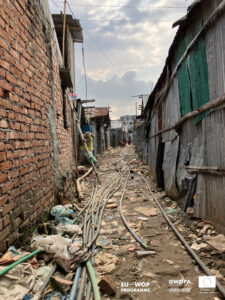
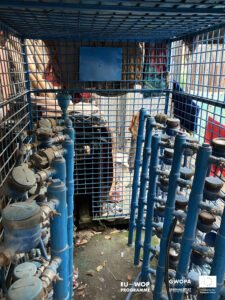
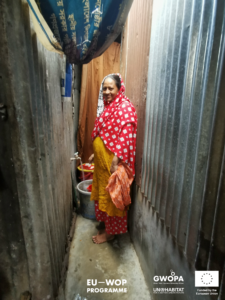
Portraits of WOPpers in the VEI Dhaka WOP
Marjolein van der Male, 27 years old, Young Expert at VEI, industrial design engineer and social scientist. (in the middle in the photo below)
Joined the WOP in DHAKA in February 2023. She is supporting technical distribution lines and Non-Revenue Water. I’m supporting Dhaka WaSA through data collection, validation and analysis. This adds value as Dhaka WaSA already collects data but has not yet sufficiently analyzed its water distribution. This analysis will help because it will allow them to take measures to cut down on wasted water, which is essential to ensure customers can count on reliable services, especially during the dry season. We involve the staff of Dhaka WaSA in the work and train them on meter reading and validation so they will progressively take this over this work and carry it out independently down the line.
The most valuable thing about the wop is its real partnership and knowledge exchange. I’m learning from VEI experts but also from the DWASA experts.
Shirin Begum (on the right in the photo below)
I have been working with the VEI-Dhaka WASA WOP since May 2018. My job is to help Dhaka WASA ensure water access to low-income communities in Dhaka. First, I identify areas and seek proposals for funding, select NGOs and contractors, and manager tenders for NGOs. Dhaka WASA has a department community programme and community relationship, under the commercial manager responsible for. These people are responsible for different moss zones, and they give permission to work in the areas and support the construction work and troubleshooting. MoU between Dhaka WaSA and community-based organisations will look after the asset organisation to look after the soft stuff, Dhaka WaSA looks after asset management and maintenance. Through the wop, the DMA training module and master trainers organised by Dhaka WaSA based on wop expertise developed a training centre…revenue collection also. During our wops, we also put Dhaka WaSA and the community/consumers (before just the ‘muscle men.’), Helping build the relationship between Dhaka WaSA and community, and build trust based on improved service.
“The poor are often seen negatively by utilities because they rely on illegal connections. However, If they are getting reliable water from the company, they can be very good customers and pay their bills. They just need service!”
